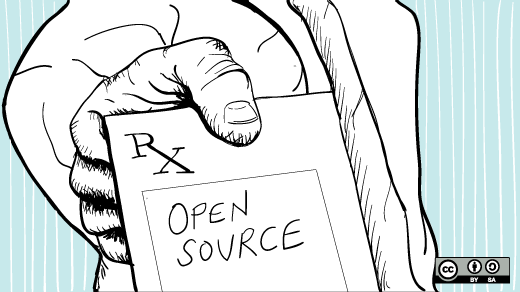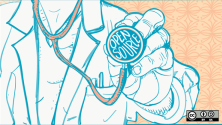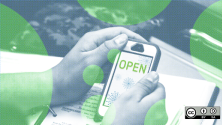Fred Trotter is easy to recognize; he's a tall man with an equally big presence. Whether he's sporting his signature wild shock of blond hair or has shaved it bald as he does once a year or so, he can't be missed in a crowd. Any place where open source, big data, and healthcare-oriented people are gathered, you are likely to find him and his crew.
 He's a frequent speaker at OSCON and was recently a panelist at the SXSW MedTech Conference, which is where I caught up with him to ask about his passion for open source and health care related data.
He's a frequent speaker at OSCON and was recently a panelist at the SXSW MedTech Conference, which is where I caught up with him to ask about his passion for open source and health care related data.
I've known Fred for about 15 years or so, first as a contributor to OpenEMR and later we accidentally met in person at the University of Texas. It's pretty cool to come face-to-face with folks you've only know online and, mostly, from working with their contributed code! Over the years, Fred has hosted a couple of open source healthcare IT conferences and done some great work in the field for ClearHealth/MirrorMed with Dave Ulhman and now focusing on open data.

How long have you been involved with open source?
I was involved with open source ever since my first job, which was about 15 years ago. My second job was with Rackspace back when it was a much smaller company, and of course Rackspace was one of the pioneers with Linux. I worked in Internet security before I focused on health IT, and I was an enthusiast for open source there too. So, I have been involved in and supporting open source, and open source has been supporting me back for my entire professional career.
When did you first become a contributor and why?
My first serious open source contribution was some serious operating system fingerprinting R&D...
What was your first major project in the FOSS community?
I am most famous for my contribution of FreeB (an open source medical billing package), which I think I did around 2003. FreeB was rapidly integrated and then swallowed by the various open source EHR (electronic health records) projects, but it was significant because it was the first time X12 electronic billing was found in the same package as paper claims generation. I contributed that code because I was scratching my own itch. I needed to have medical billing working at some of my clients at the time.
What is your most recent project?
Although I still try to make open source software contributions, I am now mostly focused on releasing open data. So my work at DocGraph has become my venue for contributing to the community. We also have created a company to specifically commercialize DocGraph data sets called CareSet. I also work with a company called Open Source Health, Inc., and although I do very little coding myself for them, I am very happy with the direction they are going!
Where do you see free and open source software headed? Specifically in the heath IT area?
It's hard to say. Generally, health IT has been surprisingly unwilling to deeply support open source software. Despite the huge successes, starting all the way back with VA VistA, for FOSS in health IT, it still struggles for respect, adoption, and consistent funding. This is why I am excited to work for Open Source Health, Inc. (OSH) which is committed to funding critical projects.
What are your views on how people can get involved at a level where they can make a living off of it?
I think the answer to this question is very difficult for open source generally and open source health IT. Dual licensing, open source, and other models have really proven themselves in the not healthcare software marketplace. But if you are in healthcare, I would focus more closely on the business case you are addressing. I have seen good open source projects languish in health IT, and I have seen just OK projects really take off because they focused on a real healthcare need. The temptation in healthcare is to try and start a business that makes healthcare into what it "should" be. That is suicide for health IT business plans. You need to find a way to change the world for the better and get paid well under a three party (payer, patient, provider) economic system that dominates in the U.S. Find a business plan that works first, and then work from there.
Describe a "Day in the Life of Fred" (and, for your team).
When I have a project due, I frequently code for 10-15 hours at a time. This is not terribly healthy, but it is surprisingly effective at getting things done. More and more I am relying the team around me at DocGraph, OSH, and CareSet to get things done rather than doing these sprints. I wish I could pretend that there was something heroic about my development sprints, but they are something of an addiction. Coding something from scratch to seeing it used by people is one of the great underestimated live pleasures, and I am afraid I sometimes glut. Learning balance is something I will be doing "real soon" when I finally decide what I am going to be when I grow up.
Are you speaking or attending any upcoming conferences? Which ones?
I love OSCON, and I wish I could afford to go every year. All of the Strata conferences are amazing for anyone who works with big data. Datapalooza is a requirement if you care about open healthcare data. HIMSS is important and I always enjoy my friends there, but the tradeshow floor makes me depressed about the state of the industry.
Anything you would like to add?
One of the things we touched on a bit was sustainability. The software ecosystem really depends on open source. Open source projects really are infrastructure for synthetic thinking and the artificial intelligence of the network as a whole. But we still have important projects, like OpenSSL, that struggle for funding. We see what happens when our infrastructure fails us with problems like heartbleed.
In health IT, I think the industry has still not really figured out that at least some of the software really needs to be infrastructure, and by having proprietary systems where we should have open source solutions instead, we end up with what amounts to a toll bridge infrastructure model, which is a great model if you own the toll bridge. I think there will be a huge opportunity for open source health IT after meaningful use dollars are gone, as providers realize that EHR vendors (et al) want to be continually paid meaningful use level dollars, so we will see.






1 Comment